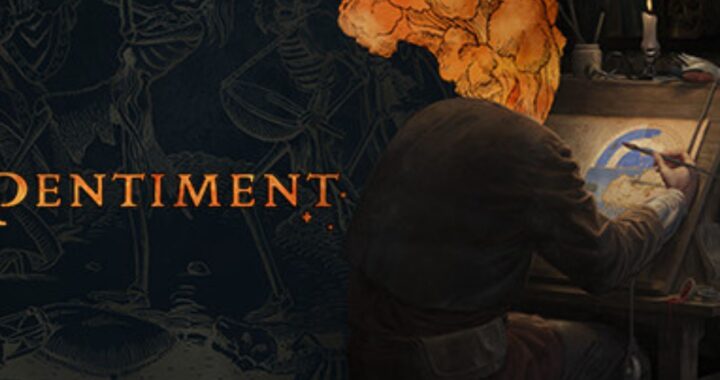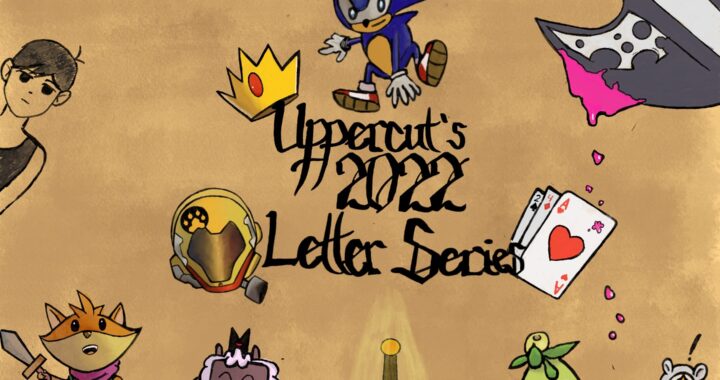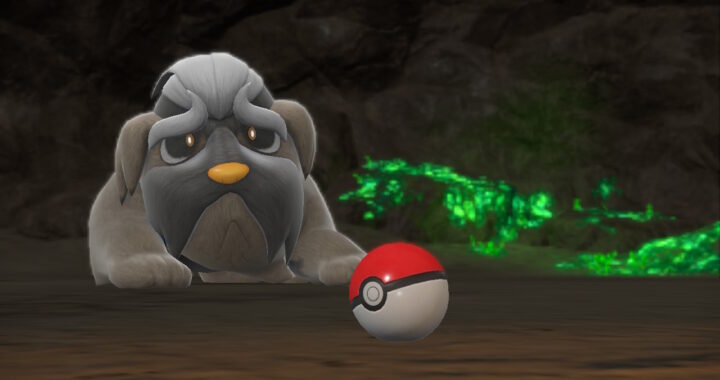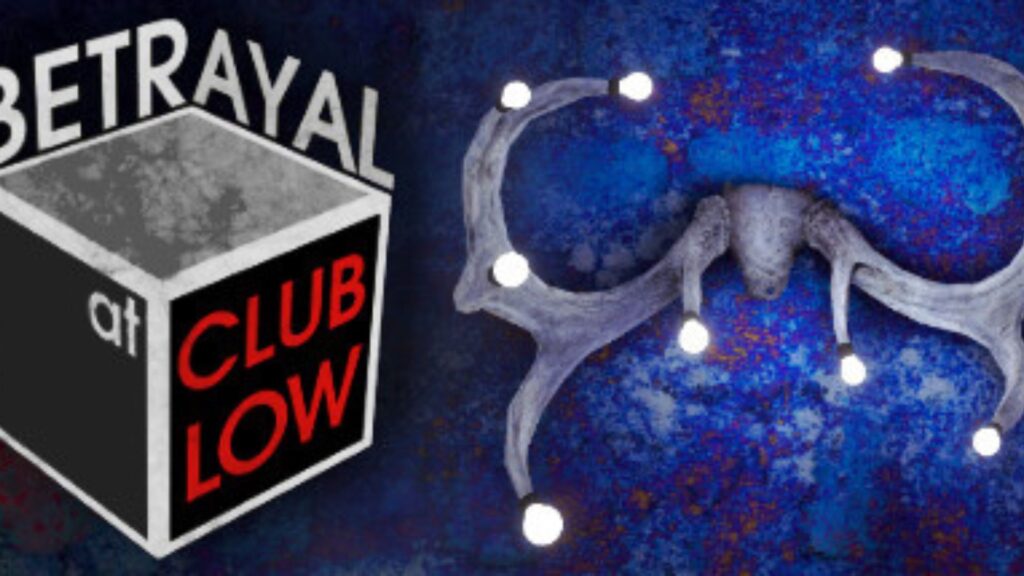
Image Source: Cosmo D
Betrayal At Club Low: Why Roll The Dice?
Betrayal At Club Low is a point-and-click adventure game, or perhaps a role-playing game, about an unhinged night spent in a surreal place. In this, it is almost exactly like The Norwood Suite, or any of Cosmo D’s other games. Cosmo D’s consistently bizarre aesthetics, musically oriented sensibilities and flair for the genuinely strange have long made them practically peerless in their ability to transport players to a world that feels genuinely other to most video games, like nothing you’ve seen or heard before. They are all of a type, all of them adventure games, all of them ingeniously assembled from slightly naff-looking 3D assets into some of the most compelling audiovisual cityscapes I have ever seen. Betrayal At Club Low is another one of these, certainly; the city is incredible, the single building the game takes place in even more so for its perfectly crafted smallness. It is also something else entirely, in ways that quickly become clear once you begin to play in earnest. Betrayal At Club Low is the first of its kind in an important way: it models its world not just in surreal tableaus, but also extensively utilizes dice, and the effect of this on Cosmo D’s depicted world is strikingly profound.
In Tales From Off-Peak City, Vol. 1 there is no wrong way to make a pizza. In a game rich with creative flourishes both funny and surreal, this centerpiece mechanic is well-chosen and incredibly executed. Regardless of whether you cover your pizza in mozzarella or gummy worms or human brains, your clients will find something beautiful in it, and effusively compliment your inspired choices. However you’ve chosen to construct your pizza, you’ve done it right, and all that changes is the music the game generates to represent your pizza, and the content of the eventual praise you receive. It is a game where everything is in its place, and the game itself is a matter of finding it, being surprised by it, and, like The Norwood Suite before it, letting your delighted astonishment at this peculiar world do the work of allowing its sinister undertones to sneak up on you.
Adventure games are deterministic experiences, even in the already deterministic medium of video games. Classically, there is little to no randomness involved in the experience: even if you have a sword, whether you hit or miss with it is purely dependent on whether it is the intended solution to your problem. The puzzle is in figuring out how things are supposed to go, if there is meant to be a puzzle at all. Often enough, the meat of an adventure game is simply in getting to experience the flow of its story, loosely mediated by your own feedback as a player. How that feedback is gathered varies; these games may have puzzles, but other takes introduce platforming, minigames and, in the case of Betrayal At Club Low as well as games like Disco Elysium (see this post by S. Donnelly for an interesting look at how dice affect that game’s presentation), stats and dice rolls which put them in the nebulous territory of “role-playing games.”
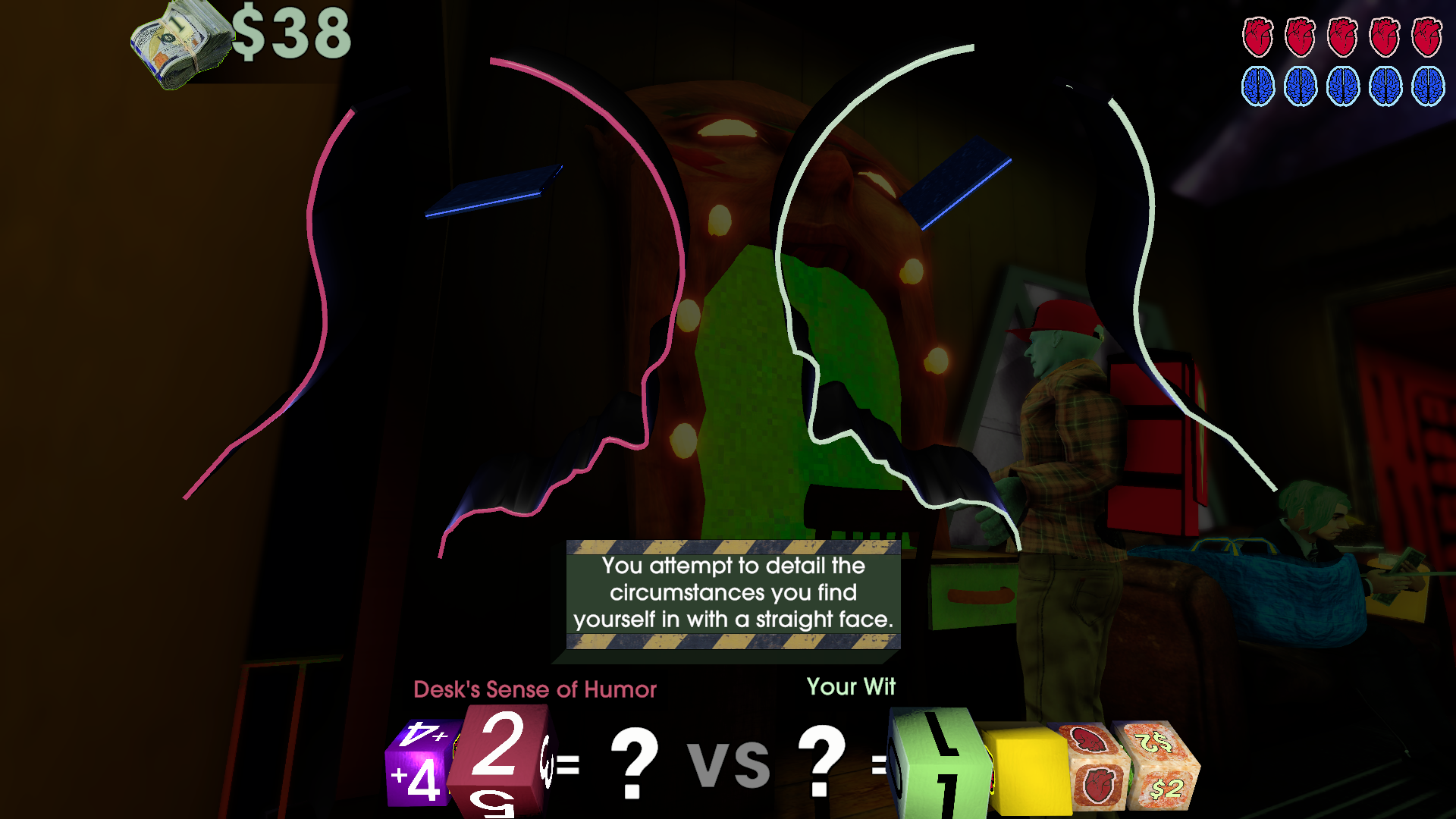
In Betrayal At Club Low, you are thrust into a barely managed chaos, a situation where an absolute storm of factors is coming together into the most confusing night of the lives of everyone involved. Everything is coming together at Club Low, and every individual thing, even you, constitutes but a single die in roll after roll. You roll all of the dice on your side, and the opponent rolls theirs, and the higher number wins, as simple as that. However, every side of your dice is customizable, and their effects need not be limited to numbers alone, as some faces of the die can hurt you, heal you, reroll other dice, even steal dice from your opponent, creating an entire field of possibility on your side to manage according to your whim and tolerance for risk. Far from making you powerless in the face of the creeping encroachment of sinister forces, the dice instead grant you the possibility of victory over them. This mastery is not inherent: it is not so much determined by your stats (although having higher numbers to work with does help) but by arranging more and more factors in your favor. To truly become an unstoppable force, a pizzaiolo needs to seed doubt, spread chaos, gather allies, pilfer artifacts and, perhaps most importantly of all, have as many pizzas on their person as humanly possible. Through the dice, perhaps the quintessential signifier of randomness, a tone is masterfully conveyed of riding a wave of coincidences that you have manufactured, aided by the bizarre possibilities arrayed before you.
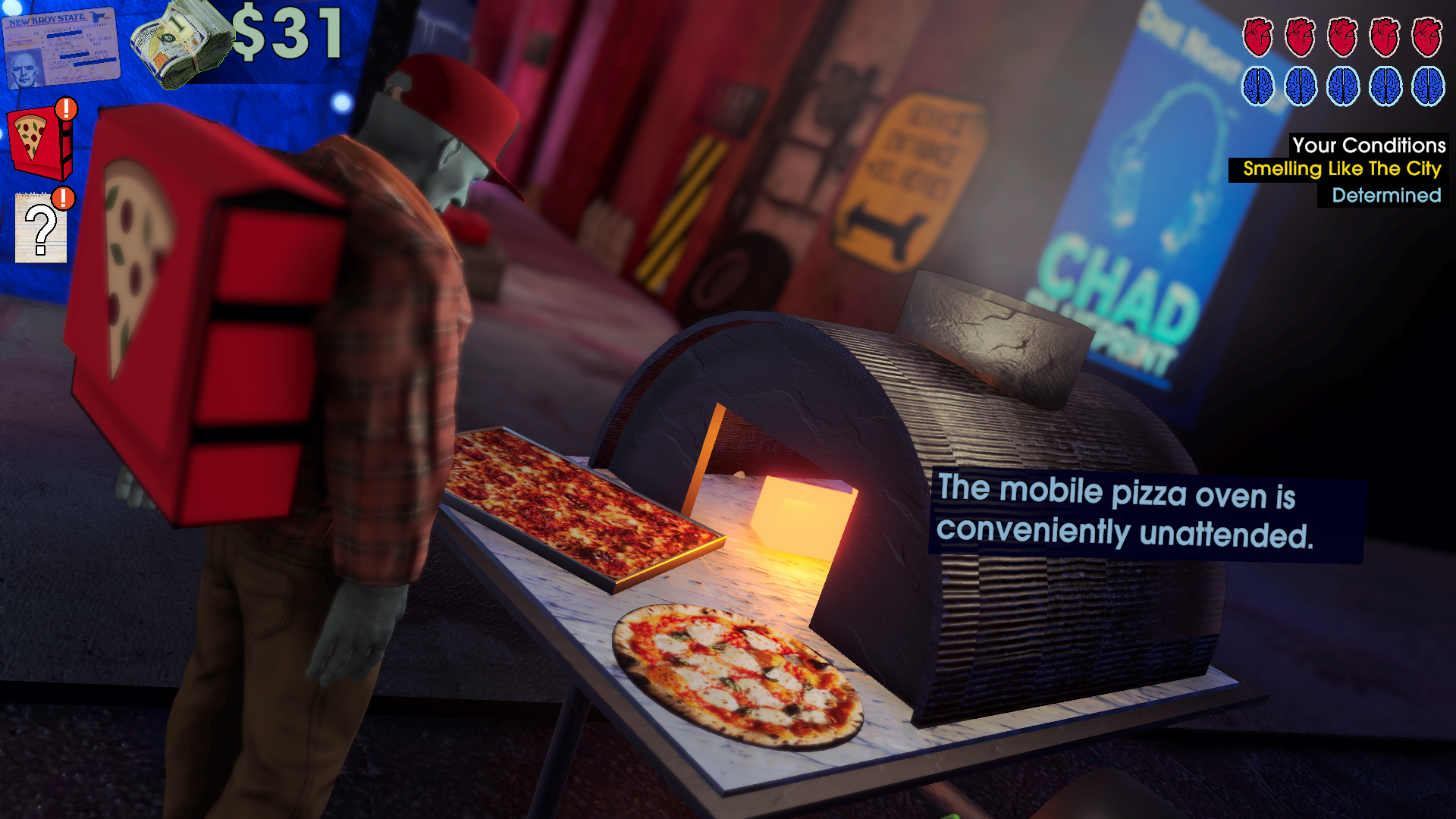
This sense of possibility hints at the analogy between tabletop roleplaying games and roleplaying video games, which starts at their shared origin. In the video game sphere, RPGs originally derive from adaptations of Dungeons & Dragons, a proud and long lineage of games that combine the unlikely elements of playing the role of a character, exploration of dangerous places and the mass murder of endless hordes of monsters in a quest for power. The latter two of these aspects translate very well to video games, which can adequately simulate both the act of enthusiastic killing and the visage of a dark labyrinth with far more immediacy than a person verbally improvising a description.
Far less clear is the roleplaying aspect: what does it mean to “play a role”? In a tabletop setting, this is generally obvious because tabletop RPGs generally require you to speak in a character’s voice and narrate their actions in a very literal sense. In a video game, even one with “meaningful choices”, every possible outcome is circumscribed by the simulation, which unilaterally sets the rules of what can be done and how. This is fundamentally different from the open-endedness of a tabletop game session, where the logic of the setting itself is placed solidly in the hands of the players and effectively nobody else, as even prescribed mechanical outcomes in tabletop RPGs ultimately bend to the interpretations of the players employing them. Even a game master, a player put in charge of playing the setting opposite a set of characters and arbitrating its logic establishes that setting’s conventions in conversation with the other players, for all that the rules may be written in a book and their implications may be written in their notes. Of all the functionality of a tabletop RPG, it is this conversation that is truly impossible to fully automate in a video game, the quintessential quality of the format. In light of this, what does a dice roll change?
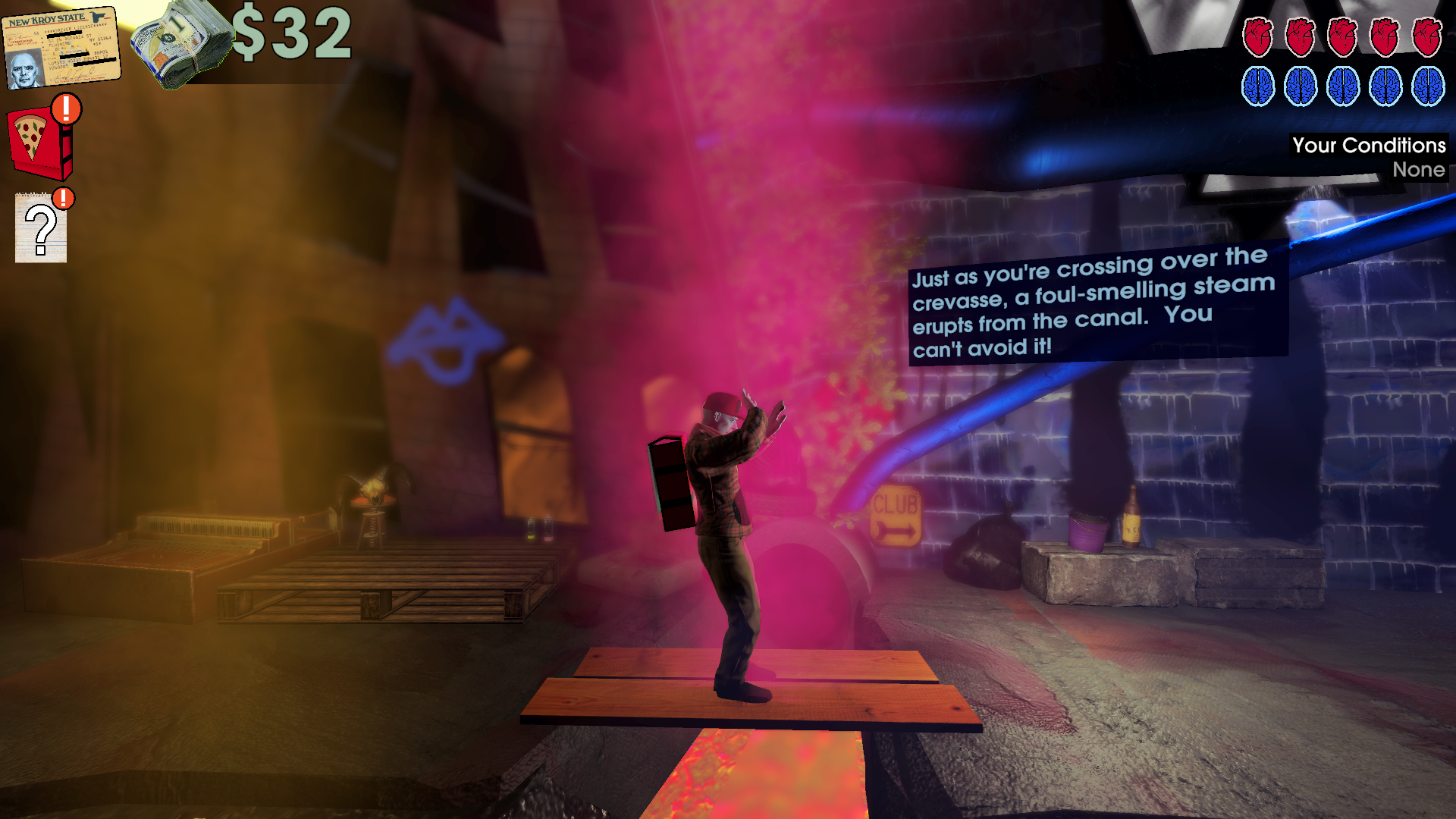
The very first roll you will make in Betrayal At Club Low involves crossing a crevasse that for all intents and purposes serves as an open sewer, where you are unavoidably assailed by a foul-smelling steam. This is not a roadblock or a puzzle, but a sort of reality check, using a stat of your choice for the roll, with the consequences thereof ranging from embarrassment to exhaustion to sudden insight. It is a tutorial, yes, a way to introduce the basic mechanics of the game, but it is more than that as well – an invitation not just into the mechanical rules that the game to come will follow, but its very nature, and the possibilities it is interested in exploring. The crevasse is much like reaching for a tie on a ceiling fan and immediately dying of a heart attack: an off-beat start, certainly, but one that lets you know very clearly what sort of experience you’re in for. The trick of feeling spoken to, much like in a tabletop game, is the opportunity to eagerly collude with your game master.
As far as opportunities to collude go, Betrayal at Club Low delivers greatly. There is abundant choice here, but not in the “meaningful choice” sense where dramatic choices are followed by dramatic consequences. Instead, your choice is in how you want to approach the unhinged world you occupy, where the valid approaches range from the incredibly straightforward, like holding your breath to ignore a stench, to the impressively esoteric, like merging your consciousness with a security system in order to see into the hearts of people. To a certain extent, much of this comes down to the dice roll’s function in manufacturing certainty, the entanglement between numbers on the dice and unlikely outcomes in the setting, which guarantees that if the dice should show an improbable enough result, an improbable outcome can be produced with no further justification. This does indeed seem to be the case in Betrayal at Club Low: the things you do are wilder, your presence more overt, your capabilities as a pizza delivery person far more extensive than the fairly sedate, if invasive exploration that the same job permitted you to do in Tales from Off-Peak City. The dice are here to empower you to do things literally heretofore impossible in Cosmo D’s settings.
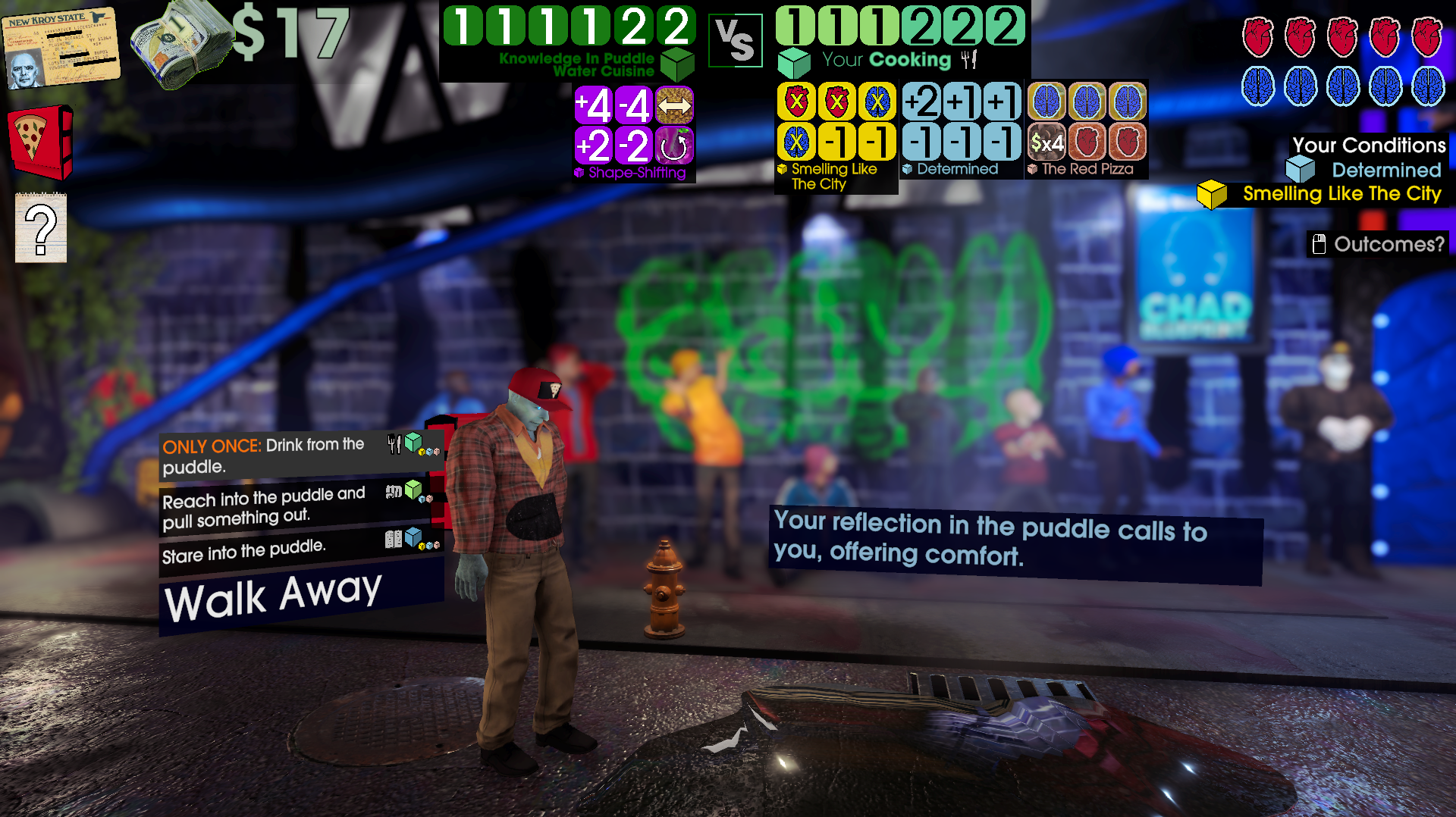
At the same time, the dice also provide a model. The collusion between the game and the player does not end with the dice roll justifying outlandish action. No, the dice roll opens up an entire way of seeing the setting. In The Norwood Suite and Tales From Off-Peak City, Vol. 1, your window into the lives of other characters was the ability to eavesdrop on them with impunity, teasing their secrets out simply by listening carefully from a distance or, when the time came, approaching them and giving them what they want or need. In Betrayal At Club Low, you get a much closer, more direct look, as every character and even object’s motivations, prejudices, lacks and abundances are laid out before you in the form of the dice they roll to oppose you, with a name and context for each, presented clear as day for you to ameliorate, weather and occasionally exploit for your benefit. You no longer overhear characters speaking to their needs, as the numbers do the talking, perceived directly and materially in this altogether more urgent model. The game is eager to inform you about these, to let you know about every angle you can take and every problem you might face, and to provide many ways to do this. This priceless avenue of collusion, putting a number on even outlandish possibilities, makes this particular vision of Off-Peak City immediately more intelligible, and it recasts the city’s leisurely, subtly sinister atmosphere into the perfect setting for a madcap heist, where your curiosity is backed with a direct line into the workings of the setting. It is a beautiful transition, both conceptually and mechanically, from one pace and tone to another, awe-inspiring in how completely it works on every level. To be submerged not just in the atmosphere, but the actual logic of this setting is an incredible gift I never knew I wanted.
This is why you roll the dice. The dice are a way of knowing and parsing the world, a playful divination done together. In this relationship, this collusion, Betrayal At Club Low borrows one of the most wonderful elements of a tabletop game and adapts it beautifully into video game form. In Cosmo D’s games, so impressively consistent in their sensibilities even as they innovate on their presentation, the dice roll is an unforgettable and distinctive addition, the explanatory power of a die providing a language all its own that makes a setting legible and manipulable, and your character that much more of an active-seeming participant in it as a result. No longer a ghost, your hands now rest on the controls, ready not just to observe, but to find out.
Special thanks go to @bluesky on Cohost for their informative look at Disco Elysium’s dice mechanics and how they inform the “role-playing” aspect of an RPG.
If you like what we do here at Uppercut, consider supporting us on Patreon. Supporters at the $5+ tiers get access to written content early.

